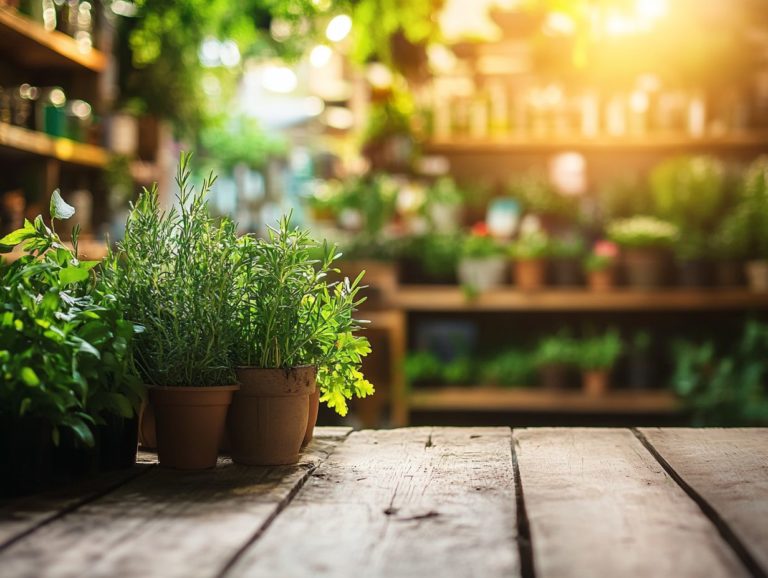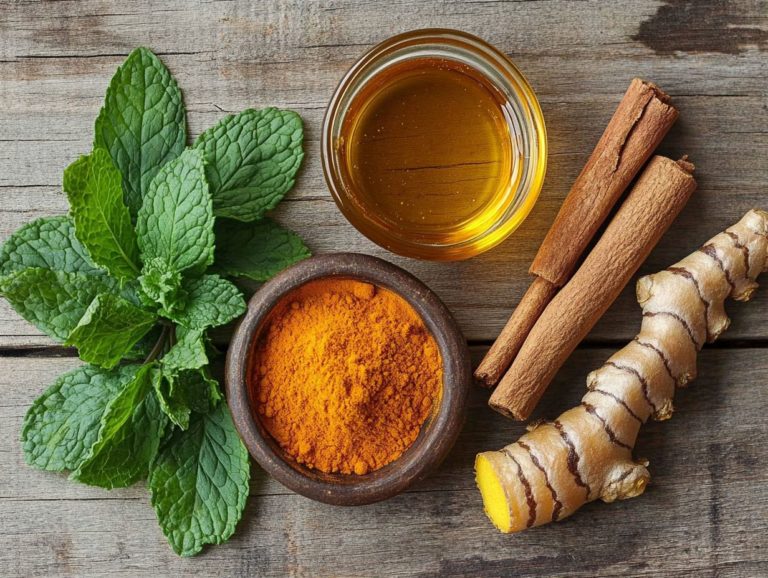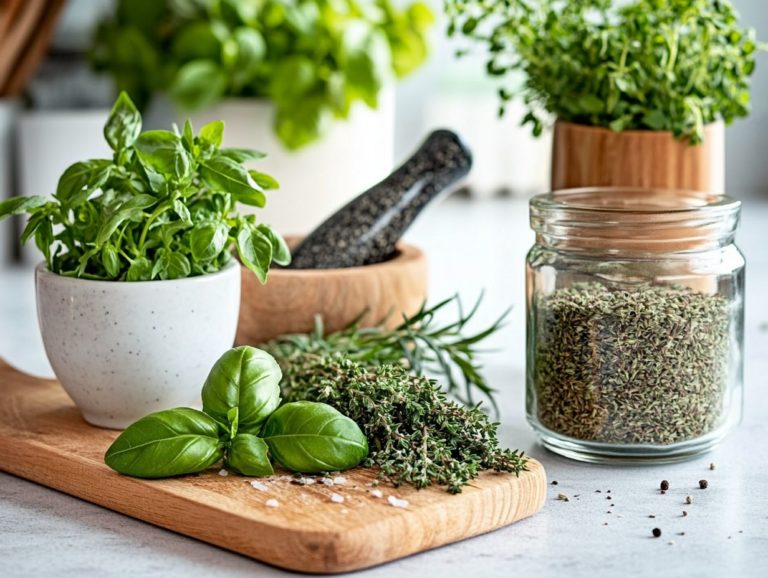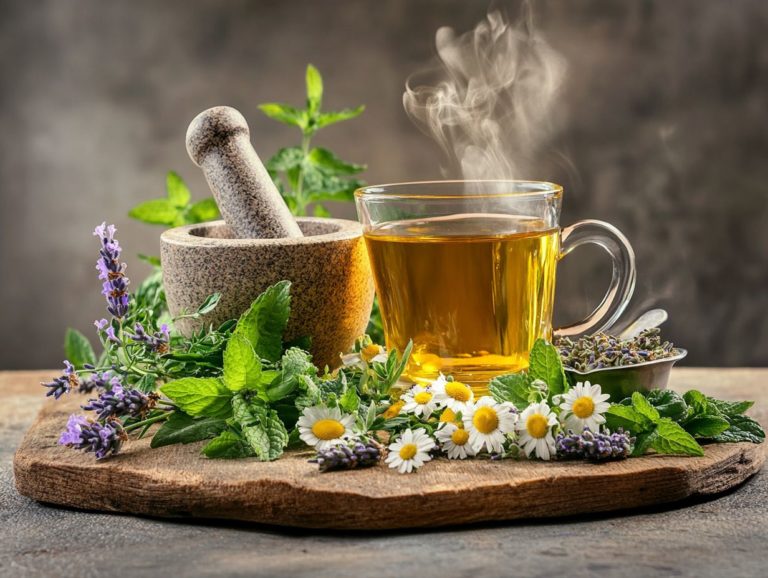Are Herbal Remedies Safe for Children?
Herbal remedies are becoming popular as natural alternatives for managing health issues.
This is especially true for children, addressing concerns like allergies and colds.
With this rise in popularity comes a crucial need for careful consideration of safety, potential risks, and appropriate usage of herbal products.
This article delves into what herbal remedies are, highlights common options for children’s health, and provides essential guidelines for safe administration.
It also discusses the importance of consulting a healthcare professional, like pediatricians, when necessary and draws comparisons between herbal treatments and traditional medicine.
By understanding these aspects, including the efficacy and safety of herbal remedies, you can make informed choices that prioritize your child’s well-being.
Contents
- Key Takeaways:
- Understanding Herbal Remedies
- Safety Considerations for Children
- Common Herbal Remedies for Children
- Guidelines for Administering Herbal Remedies to Children
- Consulting with a Healthcare Professional
- Alternative Options for Children’s Health
- Frequently Asked Questions
- Are Herbal Remedies Safe for Children?
- What are some potential risks of using herbal remedies for children?
- Are there any herbal remedies that are generally safe for children?
- What are some common herbal remedies that should be avoided for children?
- How can I ensure the safety of herbal remedies for my child?
- What are some alternative options to herbal remedies for children?
Key Takeaways:
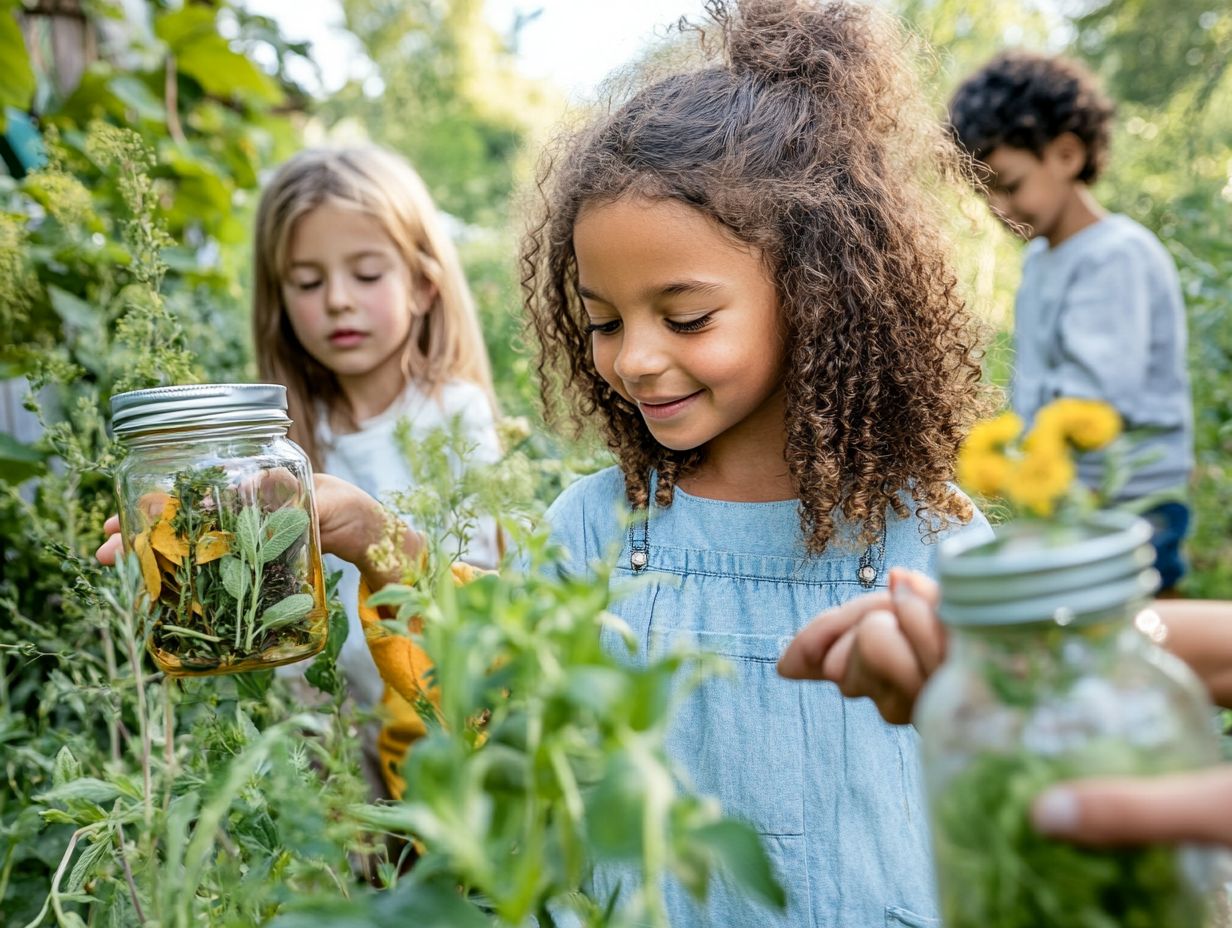
- Herbal remedies can benefit your child’s health. But be aware of possible risks and interactions with other medications.
- Proper dosing is crucial when giving herbal remedies to children.
- Always consult a healthcare professional before using herbal remedies.
Understanding Herbal Remedies
Understanding herbal remedies is essential for you as a parent seeking natural treatments for your child s health concerns.
These remedies, derived from plants and herbs, have been part of traditional medicine for centuries and are gaining traction for their healing benefits in addressing issues like colds, allergies, and chronic illnesses.
However, before you decide to incorporate herbal products into your child’s health regimen, it’s vital to assess their efficacy, safety, and possible interactions. For instance, exploring options like 5 herbal teas for kids’ health can be beneficial. This consideration is particularly important given that children’s physiological responses differ significantly from those of adults.
Experts like Kathi Kemper, MD, from Children’s Hospital in Boston, stress the importance of thorough research and following established guidelines when exploring herbal options for pediatric health.
What are Herbal Remedies?
Herbal remedies are natural treatments derived from plants, celebrated for their healing benefits in various forms such as teas, extracts, and supplements.
These remedies often draw on centuries of traditional use, offering you a whole-body approach to health that stands in contrast to the more conventional methods emphasized in modern medicine.
For example, you might find chamomile, renowned for its calming effects, to be a perfect ally for enhancing sleep or alleviating anxiety.
Echinacea, on the other hand, is frequently your go-to for boosting the immune system and warding off colds.
Unlike synthetic pharmaceuticals, which can unleash a host of side effects, herbal solutions tend to work harmoniously with your body, supporting overall well-being without harsh interventions.
This gentler approach makes them an appealing option for those like you who are seeking alternative methods to elevate their health.
Safety Considerations for Children
Regarding administering herbal remedies to children, safety should be your top priority.
Their developing bodies can respond quite differently to various substances compared to adults.
While it’s common for parents to seek out natural solutions for everyday issues like colds and allergies, it’s crucial to be aware of potential risks and side effects.
Consulting with a pediatrician before introducing any new treatment is not just advisable it’s vital for your child s health!
The American Academy of Pediatrics emphasizes that certain herbal products can trigger adverse reactions, making it vital to evaluate safety standards and consider any possible interactions with other medications.
Prioritizing these precautions is key to ensuring your child’s health and well-being.
Potential Risks and Side Effects
When considering herbal remedies for your children, it’s essential to be aware of the potential risks and side effects.
Take St. John’s Wort for example. While it s praised for its mood-enhancing properties, it can interact dangerously with prescription medications.
This interaction might reduce their effectiveness or increase side effects. Valerian root is popular for its calming effects, but it may cause drowsiness, especially when combined with sedatives.
Always consult healthcare professionals before introducing herbal remedies. Safety is paramount for your child’s unique needs.
The complexity of herbal interactions requires caution to avoid unexpected adverse reactions.
Common Herbal Remedies for Children
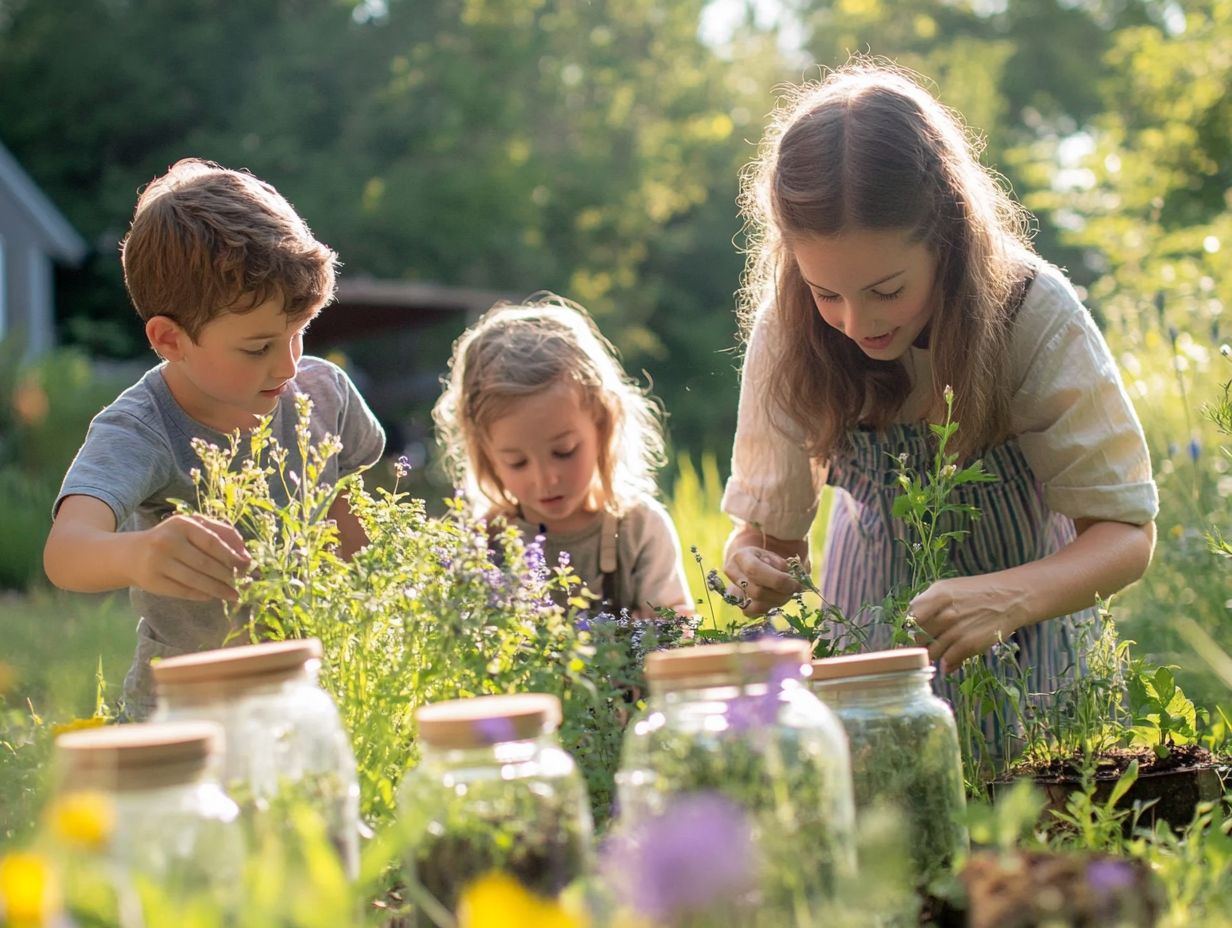
You might consider options like chamomile for drowsiness, echinacea for colds, and licorice root for respiratory health.
Types of Remedies and Their Uses
You have a variety of herbal remedies for children’s health concerns. For example, peppermint can help with digestion, and butterbur is great for headaches.
Chamomile is excellent for calming, while echinacea boosts the immune system against colds. Magnesium supports overall health.
Soothing herbal teas made from peppermint can ease digestive discomfort. Lavender promotes relaxation and helps with sleep during restless nights.
Ginger is helpful for nausea, especially during stomach viruses. Each remedy has a rich history of supporting pediatric health.
Guidelines for Administering Herbal Remedies to Children
Administering herbal remedies requires careful adherence to guidelines to ensure safety and effectiveness.
Proper Dosage and Administration Techniques
Accurate dosage and administration techniques are crucial for effectively using herbal remedies. Children metabolize substances differently than adults.
Consulting healthcare professionals is vital to determine appropriate dosages based on age, weight, and overall health.
For instance, chamomile can soothe digestive issues, but its dosage must fit your child’s needs. Incorrect dosing of echinacea can lead to side effects, so talk to a pediatrician.
Using age-appropriate formulations and monitoring for side effects promotes a safer approach to herbal therapy.
Consulting with a Healthcare Professional
Consulting a healthcare professional, especially a pediatrician, is essential for parents considering herbal remedies. This step ensures safety and offers personalized guidance for your child’s unique health needs.
When to Seek Medical Advice
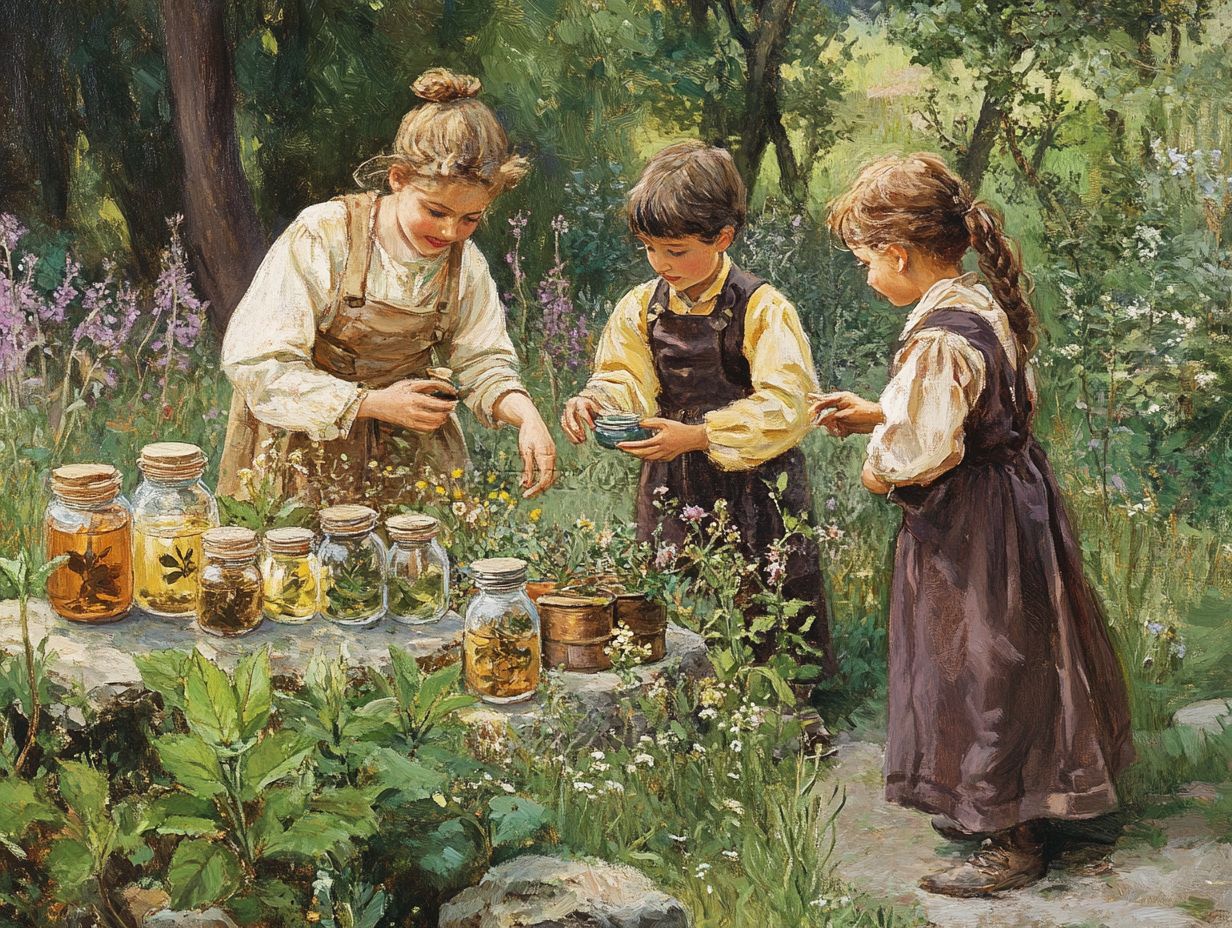
When considering herbal remedies for your children, it’s essential to seek medical advice, particularly if they have underlying health conditions or are taking other medications.
For example, conditions like asthma, diabetes, or epilepsy can greatly influence how your child responds to alternative treatments. In these situations, professional guidance becomes crucial to prevent harmful interactions or worsening symptoms.
If your child is on medications such as blood thinners or anticonvulsants, certain herbal supplements could pose significant risks. Consulting a healthcare professional ensures that you fully grasp the potential benefits and drawbacks of herbal options, all while prioritizing your child’s health.
Taking a proactive approach helps ensure safety and efficacy, ultimately leading to improved health outcomes.
Alternative Options for Children’s Health
Exploring alternative options for children’s health, such as herbal remedies, provides you with a wider array of treatments beyond conventional medicine. This approach allows you to consider holistic solutions that may complement traditional methods, enhancing your child’s overall well-being.
Comparing Herbal Remedies to Traditional Medicine
Comparing herbal remedies to traditional medicine can offer you valuable insights into their respective efficacy and safety, empowering you to make informed health decisions for your children.
Both approaches come with unique benefits and potential risks that are vital for you to understand. While herbal remedies often focus on natural ingredients and holistic wellness, traditional medicine typically relies on scientifically tested pharmaceuticals. It s crucial for you to consider how each method is regulated and the safety standards they uphold, especially regarding severe health outcomes.
The common uses of these treatments vary; herbal options generally emphasize prevention and symptom relief, whereas traditional medicine aims to tackle underlying conditions more aggressively. Ultimately, being aware of these differences allows you, as a caregiver, to weigh your options effectively and choose the best path for your child’s health.
Frequently Asked Questions
Are Herbal Remedies Safe for Children?
Some herbal remedies can be safe for children, but it depends on the specific herb and the child’s age and health. Always consult a healthcare professional before giving any herbal remedies to ensure your child’s safety!
What are some potential risks of using herbal remedies for children?
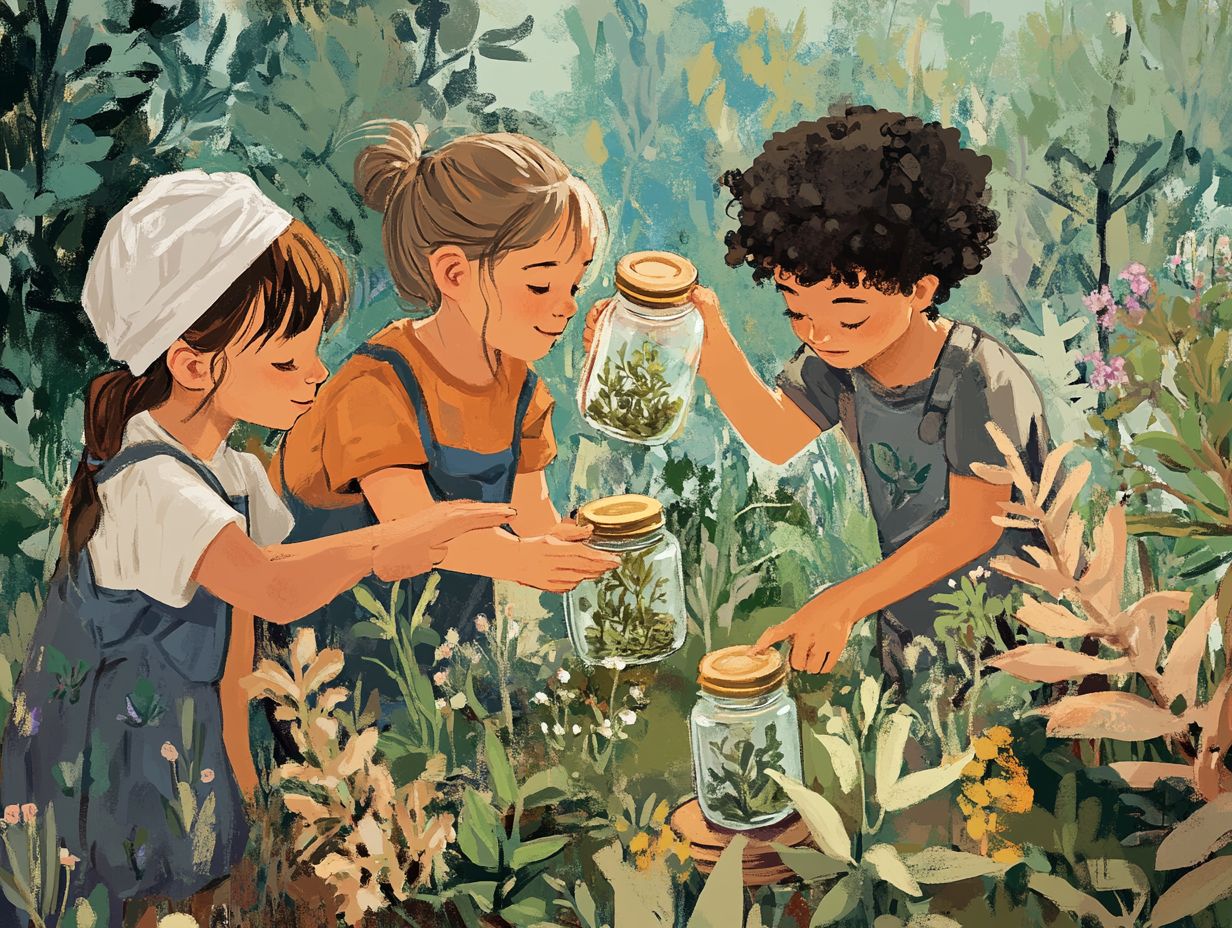
There are several potential risks associated with using herbal remedies for children, including:
- Allergic reactions
- Interactions with medications
- Incorrect dosages
It is important to research and consult with a healthcare professional before giving any herbal remedies to children.
Are there any herbal remedies that are generally safe for children?
There are some herbal remedies that are considered safe for children, such as:
- Chamomile for calming
- Ginger for digestion
However, it is still important to consult with a healthcare professional before giving any herbal remedies to children.
What are some common herbal remedies that should be avoided for children?
Certain herbal remedies may be unsafe for children, such as:
- Ephedra
- Comfrey
- Kava
These herbs can potentially cause serious side effects in children, so it is best to avoid using them for pediatric purposes.
How can I ensure the safety of herbal remedies for my child?
To ensure the safety of herbal remedies for children, such as echinacea or licorice, it is important to research the herb thoroughly and consult with a healthcare professional before giving it to your child. Always follow recommended dosages and monitor your child for any potential side effects.
What are some alternative options to herbal remedies for children?
If you are concerned about the safety of herbal remedies for your child, there are alternative options available. These may include prescription medications, supplements, or other natural remedies that have been deemed safe for children.

